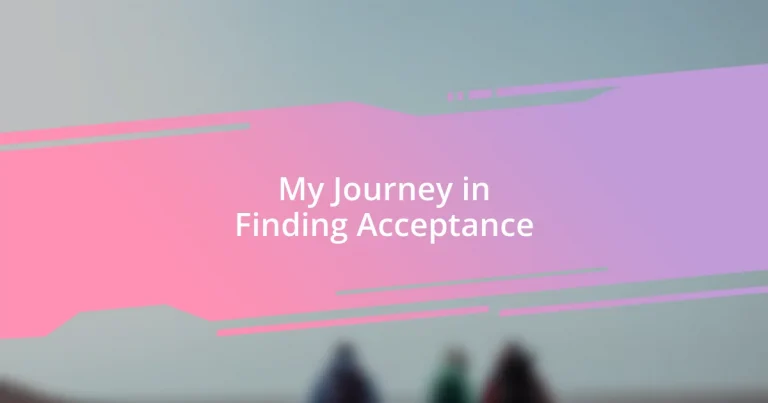Key takeaways:
- Personal acceptance involves recognizing both strengths and flaws, fostering resilience, and moving away from the need for external validation.
- Identifying barriers to acceptance, such as fear of judgment and perfectionism, is essential for personal growth and self-acceptance.
- Practicing self-compassion through techniques like mindfulness, journaling, and celebrating small victories enhances emotional well-being and deepens self-acceptance.
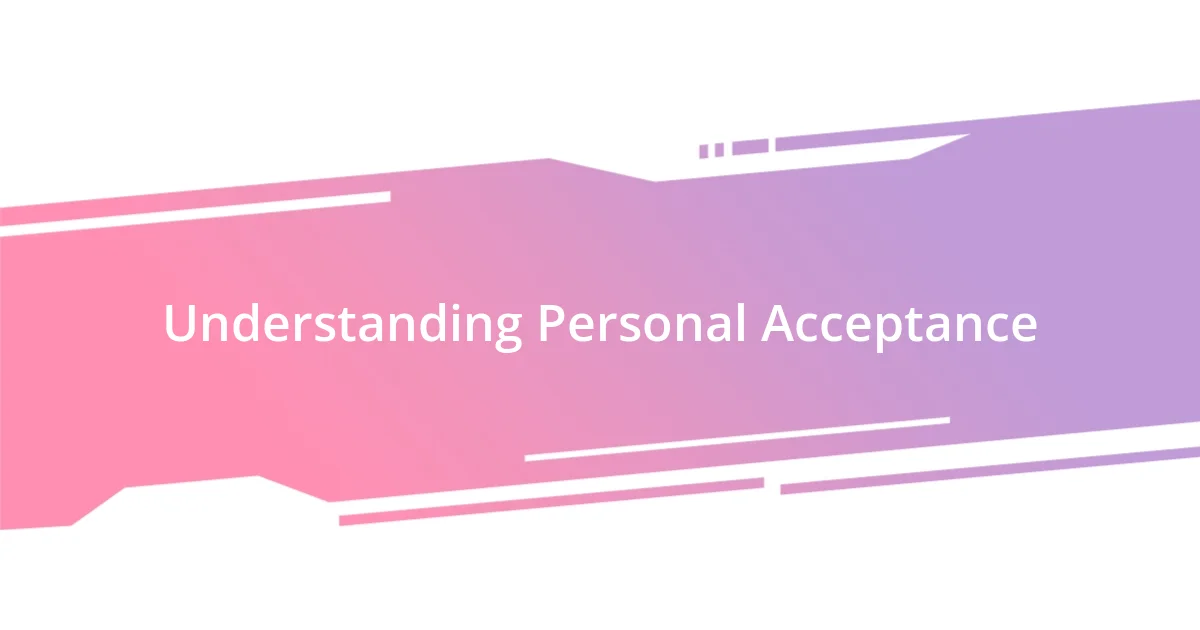
Understanding Personal Acceptance
Personal acceptance is a journey that often requires deep introspection and a willingness to embrace our flaws and strengths alike. I remember when I first faced my reflection without judgment; it was liberating. How many times have you looked in the mirror and wished you could change something? That moment made me realize that acceptance isn’t about perfection; it’s about celebrating who we are, imperfections included.
Through my experiences, I’ve come to understand that accepting myself means acknowledging my limitations while also recognizing my resilience. For instance, I used to beat myself up over not meeting certain societal standards, thinking, “Why can’t I be more outgoing?” It took time to appreciate that my quieter nature offered its own strengths, like the ability to listen deeply and empathize with others. Have you ever found strength in what you perceived as a weakness?
Another key aspect of personal acceptance is learning to let go of external validation. I went through a phase where I sought approval from friends and family, but their opinions often left me feeling drained. Eventually, I asked myself, “What do I truly value?” This shift led me to embrace my choices, regardless of how others perceived them, fostering a sense of peace within myself. Isn’t it incredible how much lighter life feels when we decide to be our own biggest fans?
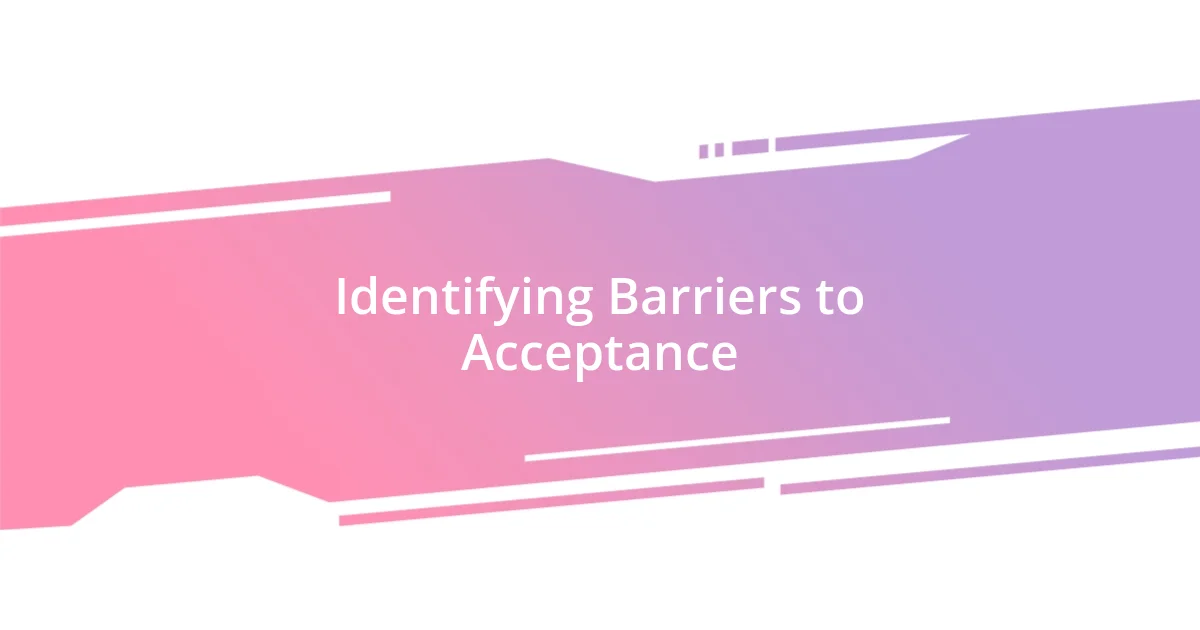
Identifying Barriers to Acceptance
Identifying barriers to acceptance is often a crucial step in our journey. Personally, I discovered that fear plays a significant role in holding me back. I used to worry about not being accepted by others, which kept me trapped in a cycle of self-doubt. The realization that this fear stemmed from my own insecurities was eye-opening; it wasn’t about them—it was about me.
Here are a few common barriers that can obstruct the path to acceptance:
- Fear of Judgment: I often hesitated to be myself because I worried about what others might think. It paralyzed me at times.
- Perfectionism: Striving for perfection made me overlook my strengths. It felt like chasing a mirage, always out of reach.
- Past Experiences: I realized that some negative experiences had shaped my beliefs, making it hard to embrace myself fully.
- Comparisons with Others: I spent too much time measuring my worth against others, which drained my self-esteem and clouded my vision.
- Unrealistic Expectations: I had set standards for myself that were impossible to meet, adding pressure instead of promoting growth.
These barriers can be insidious, slowly eroding our sense of self-acceptance. Recognizing them is a vital step toward dismantling their influence.
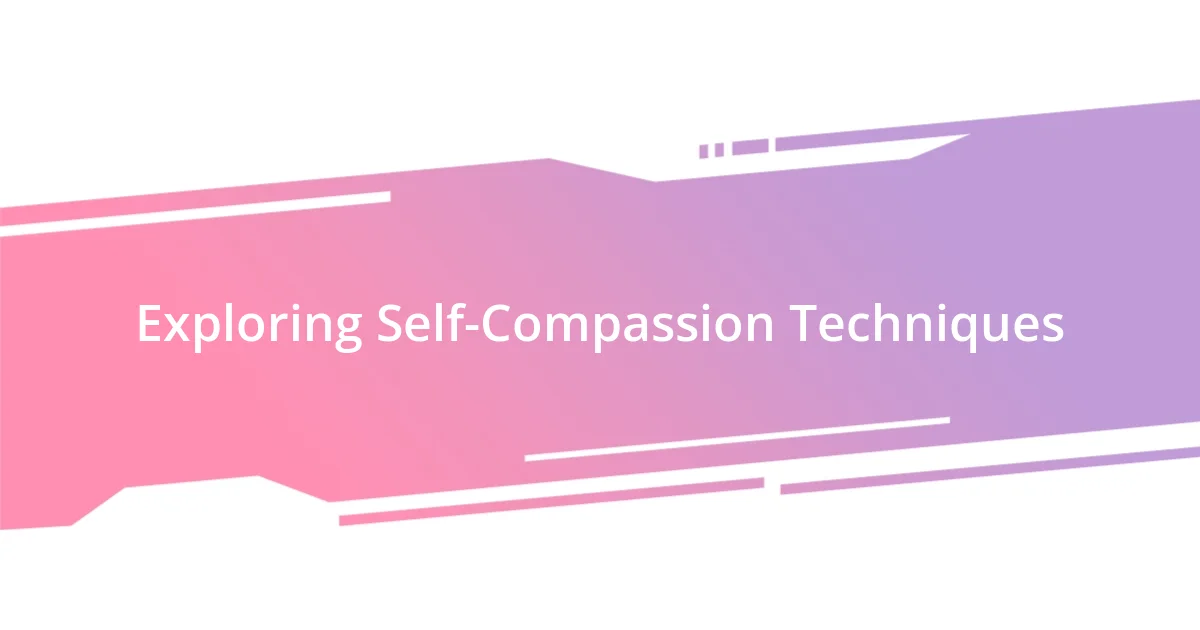
Exploring Self-Compassion Techniques
Exploring self-compassion techniques has transformed the way I approach my own journey toward acceptance. One of the most impactful techniques I’ve tried is the practice of self-kindness, especially during tough times. I recall a particularly challenging period when I faced setbacks at work; rather than berating myself, I consciously embraced a gentler inner dialogue. “It’s okay,” I reminded myself, “Everyone struggles sometimes.” This simple shift made a world of difference, allowing me to treat myself with the same compassion I would offer a friend in need.
Another technique that resonates deeply with me is mindfulness. This practice encourages us to be present and aware of our thoughts without judgment. I remember sitting in silence, feeling a whirlwind of emotions — frustration, disappointment, and even anger. Instead of pushing these feelings away, I sat with them and acknowledged their existence. “This is how I feel right now,” I told myself. Recognizing these emotions without labeling them as good or bad helped me cultivate a sense of acceptance. Have you ever tried just sitting with your feelings instead of rushing to change them?
Lastly, I found journaling to be a powerful tool for self-reflection and acceptance. By putting my thoughts on paper, I could explore my feelings more deeply. I once wrote about my struggles with self-worth, and as I did, I unearthed layers of self-doubt that I hadn’t realized were holding me back. This process wasn’t merely about venting; it turned into a transformational dialogue with myself. Through honesty in my writing, I began to uncover a clearer picture of who I was and who I wanted to become. What insights have you discovered through your own writing?
| Self-Compassion Technique | Description |
|---|---|
| Self-Kindness | Treating yourself with understanding and support in times of failure or difficulty. |
| Mindfulness | Being present and acknowledging thoughts and emotions without judgment. |
| Journaling | Writing down your thoughts to explore feelings and gain insight into your experiences. |
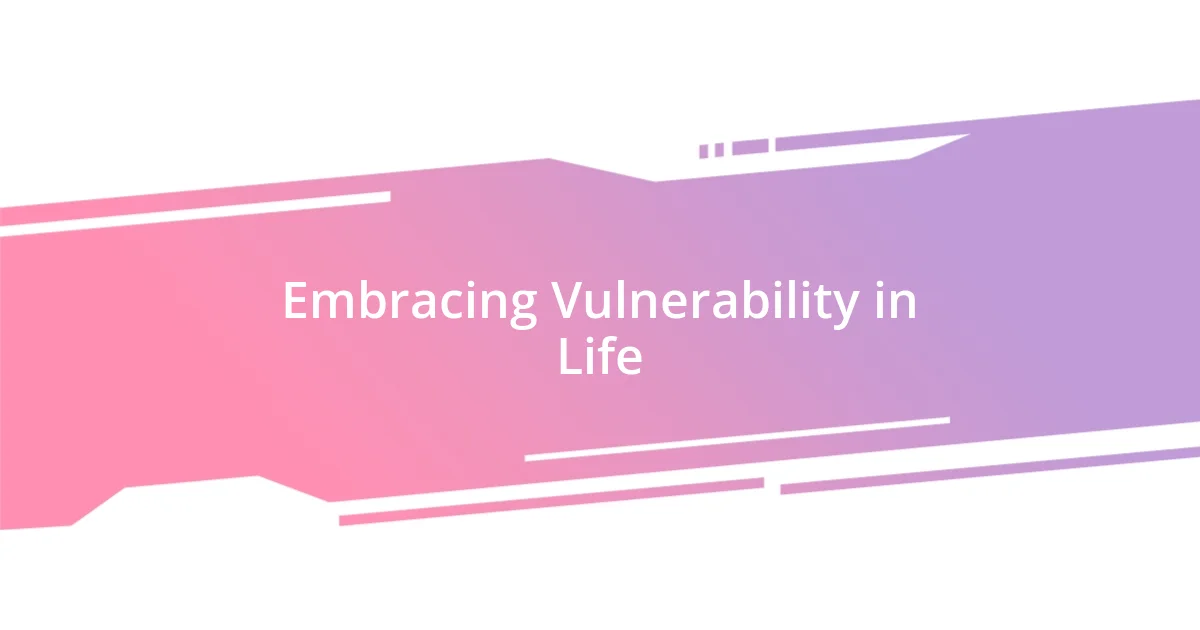
Embracing Vulnerability in Life
Embracing vulnerability has been a game-changer for me. I remember the first time I shared my inner struggles with a close friend. I was terrified of being judged, yet when I finally opened up, I felt an overwhelming sense of relief. It was as if I had been carrying a heavy weight for far too long and, in that moment, I realized that vulnerability can foster deeper connections with others. Isn’t it fascinating how sharing our true selves can lead to understanding and support?
In my experience, choosing to be vulnerable means allowing ourselves to embrace discomfort. I used to shy away from expressing my emotions, out of fear that they would be too messy or unappealing. But when I started to voice my fears and dreams, I found that these moments of honesty opened up new pathways for self-acceptance. I think about a time when I let my guard down in a group setting, sharing my feelings about inadequacy. Instead of the criticism I feared, I received empathy and support that reinforced my belief that vulnerability is not a weakness but a profound strength.
There’s something incredibly liberating about acknowledging that we don’t have it all together. Think about it—how often do we put on a brave face, only to feel like impostors inside? I remember attending a workshop where we were encouraged to share our stories. In that safe space, I discovered that so many others felt just as uncertain as I did. It made me reflect on the importance of shared human experiences, and I realized that embracing vulnerability helps us all connect on a deeper level. Have you felt that moment when someone’s honesty resonates so deeply that it sparks your own journey of acceptance?
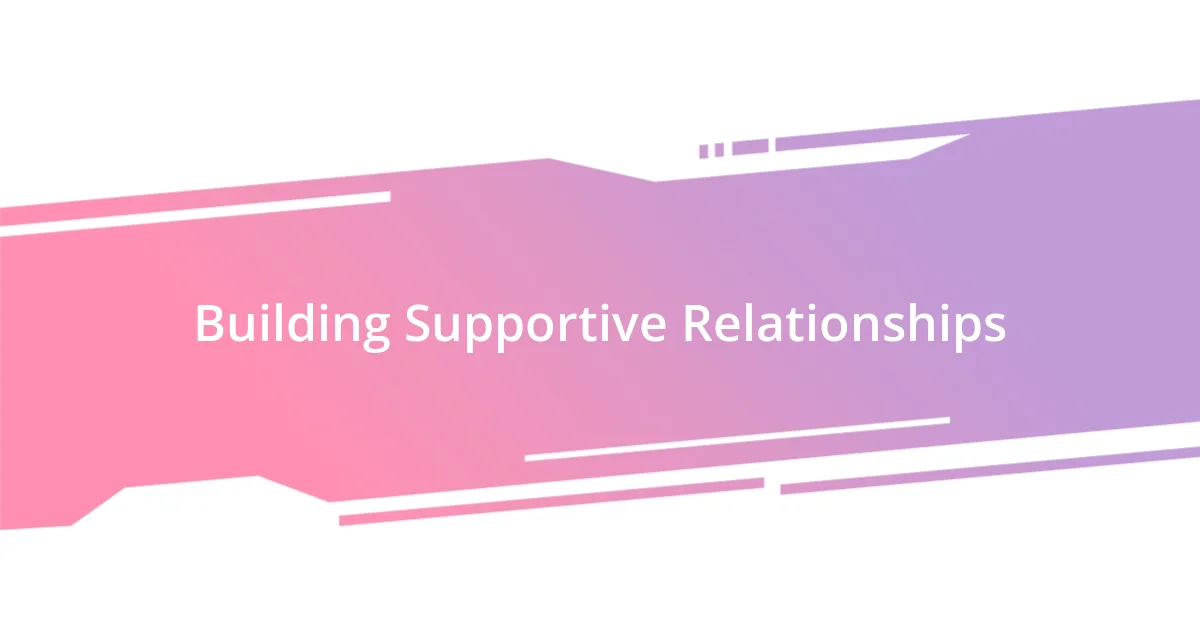
Building Supportive Relationships
Building supportive relationships has been pivotal in my journey toward acceptance. I recall a time when I surrounded myself with friends who uplifted and believed in me, and this made a world of difference. Have you ever noticed how a simple conversation with a positive person can shift your entire mood? I genuinely believe that the right support can make us feel seen, understood, and valued.
I’ve learned the importance of actively nurturing these relationships. One evening, I decided to host a small gathering with my closest friends. I wanted to create an atmosphere where openness was encouraged. During this heartfelt conversation, we shared our struggles and triumphs, reinforcing our bond. It struck me how crucial it is to take the initiative in maintaining these connections. What steps do you take to build and maintain your own supportive network?
Additionally, my experience has shown me that being vulnerable isn’t just about sharing our struggles; it’s also about offering support to others. I remember a moment when a friend of mine was feeling lost, and I reached out just to listen. By being there for them, I realized that mutual support builds a stronger foundation. I often wonder, how can we encourage more of these reciprocal moments in our relationships? I believe that fostering a culture of openness and empathy within our circles is essential for our collective journey toward acceptance.
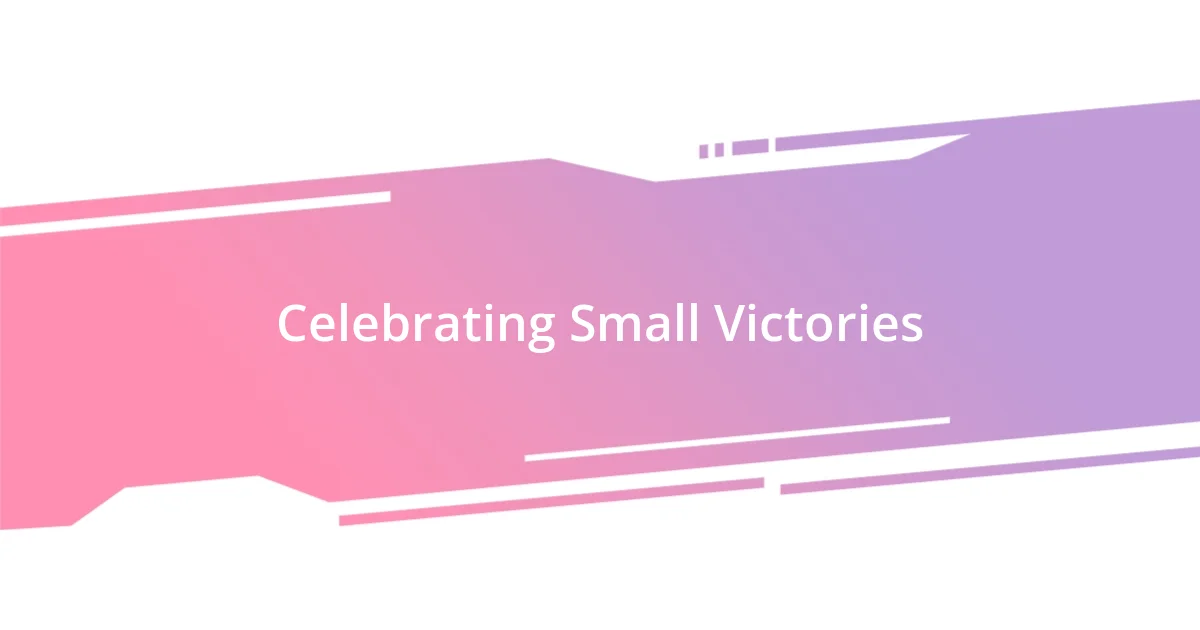
Celebrating Small Victories
Celebrating small victories is an essential part of my journey toward acceptance. I vividly remember the first time I completed a challenging task at work that I once dreaded. Instead of shrugging it off, I took a moment to step back and appreciate my effort. It felt incredible to acknowledge that every step, no matter how small, was a move toward growth. Have you ever paused to celebrate your achievements, no matter how minor they may seem?
One practice I’ve embraced is jotting down my daily wins, even if they’re as simple as getting out of bed when I didn’t feel like it. On tough days, looking back at this list serves as a reminder of my resilience and progress. It’s remarkable how recognizing these small moments can shift your mindset from self-doubt to self-acknowledgment. Can you think of a time when celebrating a small win lifted your spirits?
There’s a joy in sharing these victories with others, too. I recall a light-hearted conversation with a colleague where we laughed over our little successes, from conquering a tedious project to trying a new recipe. Those conversations not only reinforced our bond but also made me realize that celebrating small victories together can create a supportive environment. How do you think sharing your small wins can impact your relationships and overall acceptance journey?
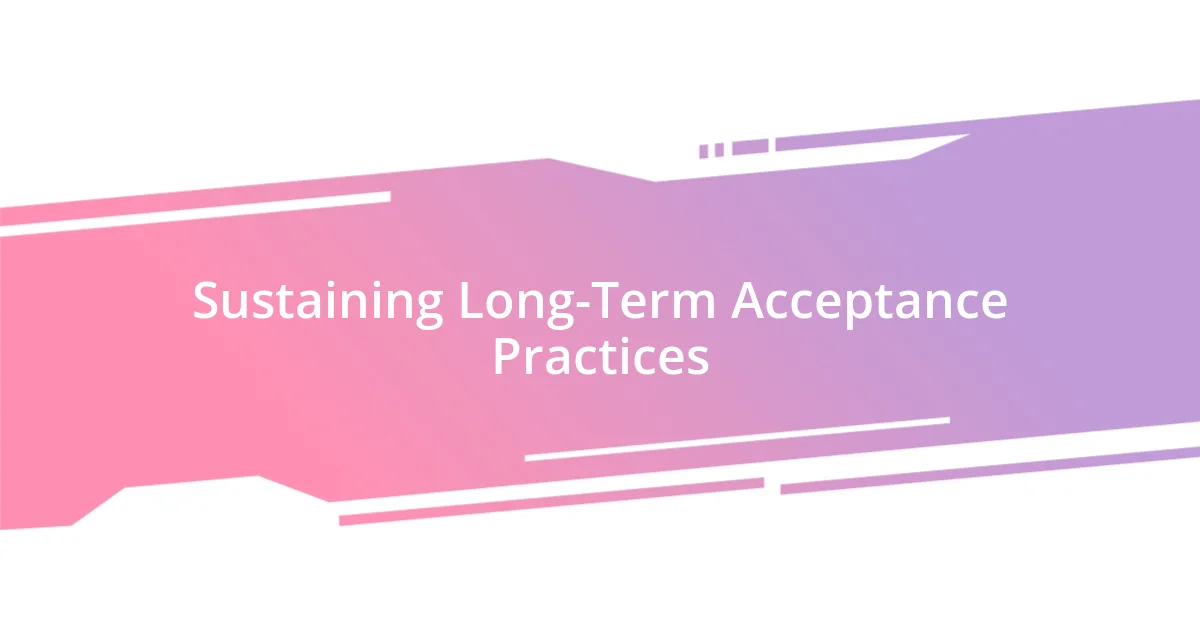
Sustaining Long-Term Acceptance Practices
Sustaining Long-Term Acceptance Practices
Sustaining long-term acceptance practices requires intentionality and reflection. I recall a period when I began integrating mindfulness into my daily routine. Taking just ten minutes each morning to meditate helped me center my thoughts and acknowledge the emotions that often dictated my day. Have you ever noticed how a few moments of mindfulness can reshape your perspective?
One particularly enlightening experience was when I committed to journaling my thoughts and feelings regularly. Each entry provided a safe space for me to explore my inner world, allowing me to track my emotional growth over time. I often found myself asking, “What do I truly accept about myself today?” This practice not only deepened my self-awareness but also illuminated areas where I could cultivate even more acceptance. Isn’t it fascinating how putting pen to paper can unveil insights you weren’t aware of?
Engaging in self-compassion has also become crucial for me. I remember a time I faced an unexpected setback, and instead of being harsh on myself, I chose to treat myself like I would a dear friend. I allowed myself to feel disappointed but didn’t linger there. Learning to embrace self-compassion has fostered resilience and encouraged me to accept my imperfections. How often do we forget to show kindness to ourselves in our journey? I believe that this gentle approach is vital for long-term acceptance.












